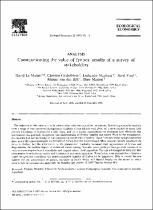JavaScript is disabled for your browser. Some features of this site may not work without it.
- ResearchSpace
- →
- Research Publications/Outputs
- →
- Journal Articles
- →
- View Item
| dc.contributor.author |
Le Maitre, David C

|
en_US |
| dc.contributor.author |
Gelderblom, C

|
en_US |
| dc.contributor.author |
Maphasa, L

|
en_US |
| dc.contributor.author |
Yssel, S

|
en_US |
| dc.contributor.author |
Van den Belt, M

|
en_US |
| dc.contributor.author |
Manuel, T

|
en_US |
| dc.date.accessioned | 2007-02-08T07:06:58Z | en_US |
| dc.date.accessioned | 2007-06-07T10:03:13Z | |
| dc.date.available | 2007-02-08T07:06:58Z | en_US |
| dc.date.available | 2007-06-07T10:03:13Z | |
| dc.date.issued | 1997-08 | en_US |
| dc.identifier.citation | Le Maitre, D.C. et al. 1997. Communicating the value of fynbos: results of a survey of stakeholders. Ecological Economics, vol 22(2), pp 105-121 | en_US |
| dc.identifier.issn | 0921-8009 | en_US |
| dc.identifier.uri | http://hdl.handle.net/10204/1631 | en_US |
| dc.identifier.uri | http://hdl.handle.net/10204/1631 | |
| dc.description.abstract | The objective of this study was to determine what value was placed on the endemic fynbos vegetation by students from a range of socio-economic backgrounds. Students at four schools were given: (a) a questionnaire to assess their existing knowledge of fynbos; (b) a slide show; and (c) a second questionnaire to determine how effectively this information changed their perceptions and understanding of fynbos' benefits and values. Prior to the presentation, few students had any knowledge of the consumptive-use benefits of fynbos. Those from privileged backgrounds knew more about the non-consumptive use benefits of fynbos than the less privileged. Most students initially attached little value to fynbos, but the information in the presentation markedly increased their appreciation of fynbos and demonstrates the positive impact of enhanced understanding. Students from privileged backgrounds continued to rank non-consumptive benefits (aesthetic and bequest values) most important. The less advantaged students felt that consumptive benefits (remunerative and subsistence) were most important. Nevertheless, even students from disadvantaged backgrounds considered the non-consumptive benefits of fynbos to be important. This is crucial because support for the conservation of natural resources in South Africa will depend largely on the extent to which stakeholders understand and appreciate the benefits they receive. | en_US |
| dc.format.extent | 1064523 bytes | en_US |
| dc.format.mimetype | application/pdf | en_US |
| dc.language.iso | en | en_US |
| dc.publisher | Elsevier Science BV | en_US |
| dc.rights | Copyright: 1997 Elsevier Science B.V. | en_US |
| dc.subject | Fynbos | en_US |
| dc.subject | Socio-economic factors | en_US |
| dc.subject | Consumptive benefits | en_US |
| dc.subject | Environmental sciences | en_US |
| dc.title | Communicating the value of fynbos: results of a survey of stakeholders | en_US |
| dc.type | Article | en_US |
| dc.identifier.apacitation | Le Maitre, D. C., Gelderblom, C., Maphasa, L., Yssel, S., Van den Belt, M., & Manuel, T. (1997). Communicating the value of fynbos: results of a survey of stakeholders. http://hdl.handle.net/10204/1631 | en_ZA |
| dc.identifier.chicagocitation | Le Maitre, David C, C Gelderblom, L Maphasa, S Yssel, M Van den Belt, and T Manuel "Communicating the value of fynbos: results of a survey of stakeholders." (1997) http://hdl.handle.net/10204/1631 | en_ZA |
| dc.identifier.vancouvercitation | Le Maitre DC, Gelderblom C, Maphasa L, Yssel S, Van den Belt M, Manuel T. Communicating the value of fynbos: results of a survey of stakeholders. 1997; http://hdl.handle.net/10204/1631. | en_ZA |
| dc.identifier.ris | TY - Article AU - Le Maitre, David C AU - Gelderblom, C AU - Maphasa, L AU - Yssel, S AU - Van den Belt, M AU - Manuel, T AB - The objective of this study was to determine what value was placed on the endemic fynbos vegetation by students from a range of socio-economic backgrounds. Students at four schools were given: (a) a questionnaire to assess their existing knowledge of fynbos; (b) a slide show; and (c) a second questionnaire to determine how effectively this information changed their perceptions and understanding of fynbos' benefits and values. Prior to the presentation, few students had any knowledge of the consumptive-use benefits of fynbos. Those from privileged backgrounds knew more about the non-consumptive use benefits of fynbos than the less privileged. Most students initially attached little value to fynbos, but the information in the presentation markedly increased their appreciation of fynbos and demonstrates the positive impact of enhanced understanding. Students from privileged backgrounds continued to rank non-consumptive benefits (aesthetic and bequest values) most important. The less advantaged students felt that consumptive benefits (remunerative and subsistence) were most important. Nevertheless, even students from disadvantaged backgrounds considered the non-consumptive benefits of fynbos to be important. This is crucial because support for the conservation of natural resources in South Africa will depend largely on the extent to which stakeholders understand and appreciate the benefits they receive. DA - 1997-08 DB - ResearchSpace DP - CSIR KW - Fynbos KW - Socio-economic factors KW - Consumptive benefits KW - Environmental sciences LK - https://researchspace.csir.co.za PY - 1997 SM - 0921-8009 T1 - Communicating the value of fynbos: results of a survey of stakeholders TI - Communicating the value of fynbos: results of a survey of stakeholders UR - http://hdl.handle.net/10204/1631 ER - | en_ZA |






